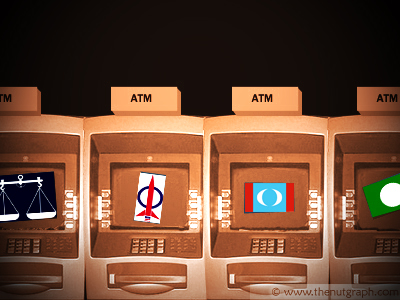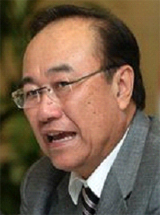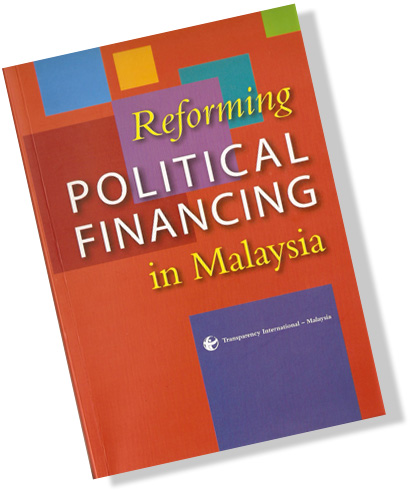
POLITICAL parties legitimately need money to carry out their functions in a democracy. After all, to stand any chance of being elected, candidates will need to tell voters who they are and what they stand for. All this costs money. Even after a representative is elected, money is still needed to do a politician’s work. Funds are required to hire research assistants, run service centres, hold community activities, and travel around the constituency.
But money seems to have permeated Malaysian politics in problematic, even illegitimate, ways. These range from overspending in elections to outright vote-buying and bribing.
The Nut Graph talks to Transparency International (TI)-Malaysia’s president Datuk Paul Low about why Malaysians need to pay attention to how political parties get and spend their money. Low also discusses what needs to happen to stop political parties from perpetuating the current system where abusing money to win elections has become the norm, instead of the exception.
TNG: Why should the public be concerned about how political parties are financed? What are some of the common problems?
Paul Low: There is an unhealthy trend in politics, that is, the monetisation of politics. This involves money being used extensively in elections, whether for vote-buying or for favours. The funding sources for all this comes from political funding, which is not transparent.
If money becomes a means of getting votes, obviously this undermines the democratic process of electing the right people. People without money don’t stand a chance [even if they have talent, capabilities, passion and commitment].
Also, money given to political parties [for such purposes] needs to be paid back. No one is going to give you money and expect no favours in return. The person who has come into power will need to pay it back somehow. So, this leads to interference in governance, closed procurements, overpricing of projects, costs overrun, and variations of orders. It comes in all sorts of ways. Political patronage becomes common, which is what has happened in Malaysia.
This is institutionalised corruption. Ultimately who pays for all this? It is the taxpayers, you and I. Not only that, funds that should be given for development aid for the poor would be redirected somewhere else. Money that should have gone towards the public interest is used to enrich certain individuals.
How imbalanced are the political parties at the moment in terms of their abilities to obtain financing for their political activities? What are the implications of this imbalance?
Of course the incumbent [would be at an advantage], with many [more] years of fundraising. The incumbent is always in a better position to raise money. They even have secret political funds. And these funds are not illegal. There are no laws against receiving funds and keeping it for the party.

The incumbent is also in a position to give out projects and favours in the form of licensing and concessions. If they ask for money, obviously those who want projects will respond.
Parties that are not in government would be at a disadvantage and will have to depend on other sources. Some may even rely on foreign funds, but in most cases, they have to raise it by passing the bag around at ceramah and dinners.
This imbalance also undermines the democratic process of elections. It cannot go on, especially when there is such fierce competition for power now. It seems that politicians are prepared to do anything to disable or disadvantage their opponents.
Given the current inequalities which favour the incumbent, what impetus would there be for the Barisan Nasional (BN) to institute changes in political financing?
There is strong resistance within the BN government to reform this area. Although TI makes recommendations hoping they will reform, ultimately, the people will have to decide. Unless the people express their distaste for the monetisation of politics and question candidates’ integrity, the incumbent will never be prepared to change.
[In fact], the incumbent might make changes if it will disadvantage the opposition party. For example, the BN might consider banning overseas funds because they don’t need such sources of funding and, at the same time, not provide a viable alternative such as funding from the state.
What signs are there that the Pakatan Rakyat (PR) would institute reforms in political financing if they came into power? How have they performed in this respect in the states where they do hold power?
I’m not really sure. If there’s no regulation, the PR will probably play the same game [as the BN]. In fact, some of the PR people come from the same BN culture. They think that if the PR comes into power, then it’s their turn to receive favours. The people have to express their distaste for that.
Politicians have to be judged and assessed for their integrity and sincerity in serving the people. We can give them a higher salary, but they shouldn’t get extra contracts or enrich themselves [through abusing their positions]. If they expect that coming into politics means a big windfall and they’ll get rich, that is the wrong idea.
The PR government really has to distinguish itself from the BN, otherwise what’s the difference? What’s the point of sanctioning one and putting in another that could be worse? Both governments will end up cleaning out the coffers and the people will suffer.
What kind of reforms should we be pushing for?

Reform of political financing must be done in parallel with regulation. The Election Commission (EC) must be more independent as it oversees elections as well as parties’ political funding. We need a Political Parties Act, which would give powers to the EC to ensure that political parties disclose how much they receive and how much they spend. This is provided the EC is independent, impartial and politically neutral, and will administer the Act fairly.
If regulation is introduced to compel political parties to disclose their sources of funding and restrict their means of obtaining political funding, there must be an alternative. In some countries, they allow state funding, where the state will provide funding to parties according to certain proportions.
Without alternatives, the incumbent will still have an upper hand, even if regulation is introduced. Reforms should ultimately try to create a level playing field for political parties to compete.
What, then, needs to happen for reform of political financing to take place?
The people have a lot to do with it. People must begin to think, “I cannot be bought. I’m not so cheap.” If politicians promise development aid, whether it’s the incumbent or the opposition, then it is our right as citizens to receive that aid. If promises are being made now, it just means they’ve not been delivered in the past.
Voters must ask for more to ensure good governance. They must want clean political parties, accountable and sincere leaders, leaders that are committed to good governance and serving the public interest, not enriching themselves.
[The last general election results after] 8 March 2008 already indicate that the public is fed up of corruption. It’s a test for both the BN and PR. ![]()
 TI-Malaysia’s book Reforming Political Financing in Malaysia was launched in May 2010 and can be purchased for RM40 at its office.
TI-Malaysia’s book Reforming Political Financing in Malaysia was launched in May 2010 and can be purchased for RM40 at its office.
The Nut Graph needs your support
[related-posts]


neptunian says
We have to stop pretending that politics is just a service. Politics is a career, much like any other. It is just more demanding in terms of “moral” responsibilities. Having said that, Malaysian politicians do not seem to know the meaning of “moral” responsibilities.
To stop “money” politics, we should really do a “Singapore”: treat politics as a career and pay accordingly. $30,000 a month is the average managing director’s pay of a fair-sized corporation. I see no reason to not pay an MP the same with the similar personal allowances/car/housing etc. In fact, I would make that TAX FREE.
For service centres, a fair sum should be allocated to all MPs, with breakdown into operational expenses/staff/overheads and a separate sum for constituent development and fixes! Political contributions greater than a certain sum should be made known – either public or independent watchdog.
Bad Rabbit says
Neptunian, I understand what you are saying and why you are saying it, but I cannot agree with you. Paul Wellstone, the late Minnesota Congressman summed up what politics is about best:
“Politics is not about money.
Politics is not about power.
Politics is not about winning for the sake of winning.
Politics is not predictions and politics is not observations.
Politics is what we do.
Politics is what we do, politics is what we create, by what we work for, by what we hope for and what we dare to imagine.
Politics is about the improvement of people’s lives.
It’s about advancing the cause of peace and justice in our country and the world.
Politics is about doing well for the people.”
Paul Wellstone was a very liberal Jewish politician from the Democratic Party, so I’m sure there will be a few saying his views are incompatible for Malaysia.
But I believe that they are universal, regardless of whether the country is a democratic, autocratic, theocratic, kleptocratic or even pantysocratic one.
neptunian says
Hii Bad Rabbit – AKA “idealist”.
It would be nice if politics work like what Paul Wellstone said, but sadly it (politics) cannot be applied to the real world. Mr.Wellstone must be an independently wealthy man or as the English say – is of private means.
If society imposes the brand of political philosophy as Mr Wellstone proposes, then only the wealthy can engage in it. We will be thrown back to ancient Rome, feudal lord times. In time we, the people, will become serfs again. History will really be repeating itself. (recommended reading – The march of Folly)
Luckily for us, that will never come to pass. (I hope)
Ellese A says
The problem with our nation actually boils down to reforming political financing. Changing to Pakatan will not change this as this is a structural issue. (see how Kelantan requests donations from its concessionaires). But only a few realize this.
I acknowledge that this is a democratic problem. See, only billionaires like Ross Perot can fight for US presidency. But we need to fix this to ensure a reasonable amount of political financing (money politics) is acceptable but must be transparent. Don’t set like Umno which bans any amount of political financing and you get a mockery of this. Neptunian’s idea is elegant. We need to start a big debate on this.